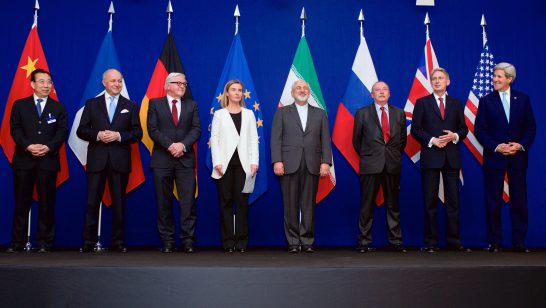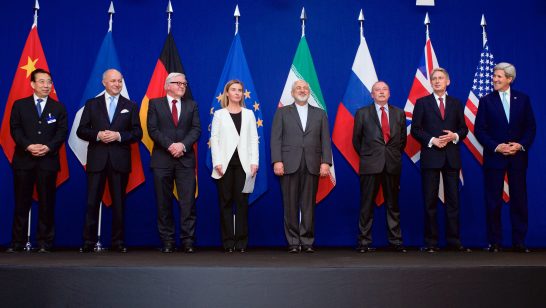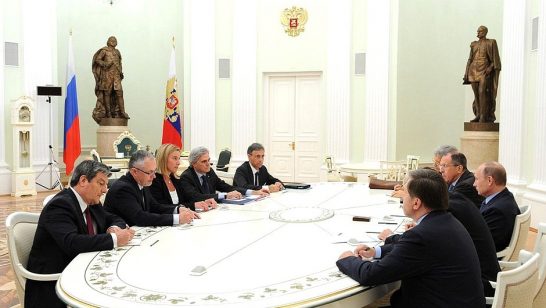
The nuclear agreement with Iran has been put into question once again last week when President Donald Trump took the stage at the United Nations General Assembly. Since taking office, Trump has been reluctant to waiver US sanctions against Iran and has repeatedly asked his advisers for possible avenues to withhold certification of Iranian compliance. The uncertainty has put a heavy burden on the so-called Joint Comprehensive Plan of Action (JCPOA) and is a political challenge for all parties to the agreement, namely Iran and the E3+3 group, also known as P5+1 (the five permanent members of the UN Security Council plus Germany). Notwithstanding its coordinating role within the P5+1, the EU has yet to take decisive measures to overcome the ongoing crisis. Failure to do so will have impact on Europe’s interests and on the P5+1´s ability to reach tangible results in any future negotiations with Iran.
Maintain the Support of the deal in Tehran
Often overlooked, the JCPOA is not merely the product of sanctions and international pressure but also the outcome of political infighting in Iran itself. It took advocates of a pragmatic approach more than ten years to gain the support of all relevant centres of power, including that of Supreme Leader Ali Khamenei. Against heavy pressure from those opponents willing to pay the political and economic costs of international sanctions, pragmatists managed to make a case for negotiating the deal and essentially vouched for the EU as its guarantor. Given the harsh criticism in Iran that talks with the E3 in 2003 had not produced lasting results, this was not an easy task.
Nuclear pragmatists such as President Hassan Rohani will be the ones drastically losing ground if the agreement falls apart. This begs the question of who would be left in Iran to actually negotiate with after the JCPOA collapses? More importantly, what incentive would Tehran have to enter into new talks – nuclear or otherwise – when no lasting agreement can be secured beyond one presidential term in Washington? With international credibility lost and those in Iran who favour engagement marginalised, conditions within which to start another negotiation process would be gravely worse.
The Status Quo Won´t Do
Against this background, the EU has a major interest in preventing any steps that might put the JCPOA as a whole in danger, such as pushing for renegotiations in delusive hope for a better outcome. Pointing out negative repercussions, however, while showing time and time again that Iran is adhering to the deal, has not changed minds in Washington. Let´s face it: Washington does not want the status quo, despite the fact that the administration does not have a solid plan on how to prevent the re-emergence of a situation where Tehran would be at the threshold of nuclear weapon capability. Thus, staying on the defensive will not be enough for the EU to preserve the agreement. With roughly eight more years to go before the UN Security Council resolution endorsing the JCPOA terminates, the remaining time should be used to look at what comes next. If the JCPOA is to remain intact, an alternative framework needs to be provided for US concerns to be addressed.
Instead of tampering with an existing agreement that has proven effective so far, all parties must thus put their efforts into jointly preparing for the expiration of the UN arms embargo and the post-2025 era. This should entail addressing sensitive issues such as Iran´s ballistic missile program or the prospects for a JCPOA follow-up process that leaves the current agreement untouched. Talks on any separate post-JCPOA agreement could include topics like an extension of existing sunset clauses in exchange for an economic incentive package and should ideally start while the Rohani government is still in place.
Make P4+1 a Viable Option
Reaching out to Washington by offering alternative political fora should be the main priority for the EU. If this fails, however, the EU needs to make P4+1 a viable option. It should determine how the JCPOA can be adequately upheld without the United States being a party to the agreement. This requires close coordination with Russia and China. The formation of a strong unified bloc should be reflected in a joint proclamation by the P4+1 states that no nuclear-related sanctions will be re-imposed as long as there is no evidence of a material breach of the agreement by Iran. At the same time, the P4+1 must clearly communicate to Tehran that it will not tolerate any suspension of the JCPOA, such as temporarily resuming enrichment activities beyond the deal´s provisions, as a reaction to US policy. A re-configuration of the P5+1 will find support in Tehran as long as the new conditions do not de facto block Iran from economic relief as specified in the JCPOA. To that end, the EU needs to prepare all options on how to protect EU companies that want to engage with Iran from US extraterritorial sanctions, including taking the case to the Dispute Settlement Body of the World Trade Organisation.
Defusing the Crisis, With or Without the US
The uncertainty about US commitment remains a burden for the JCPOA. If the current crisis continues, it is likely that Washington or Tehran will escalate the nuclear standoff by ceasing to observe individual provisions of the agreement, rendering the deal meaningless. Failing to preserve the deal would not only result in less supervision of Iran´s nuclear program, thus sacrificing the strongest tool the P5+1 currently possesses, but also to a significant loss of credibility, thus creating poor domestic conditions in Iran for any negotiations thereafter. Moreover, it would add a proliferation crisis to an already crisis-ridden Middle East. The EU has not exhausted all its means to prevent the JCPOA from falling apart. It should first and foremost strive for acting jointly with its transatlantic partner. However, the EU should not shy away from going on the offensive to protect its own interests, with or without US involvement.
The opinions articulated above represent the views of the author(s), and do not necessarily reflect the position of the European Leadership Network or any of its members. The ELN’s aim is to encourage debates that will help develop Europe’s capacity to address the pressing foreign, defence, and security challenges of our time.



